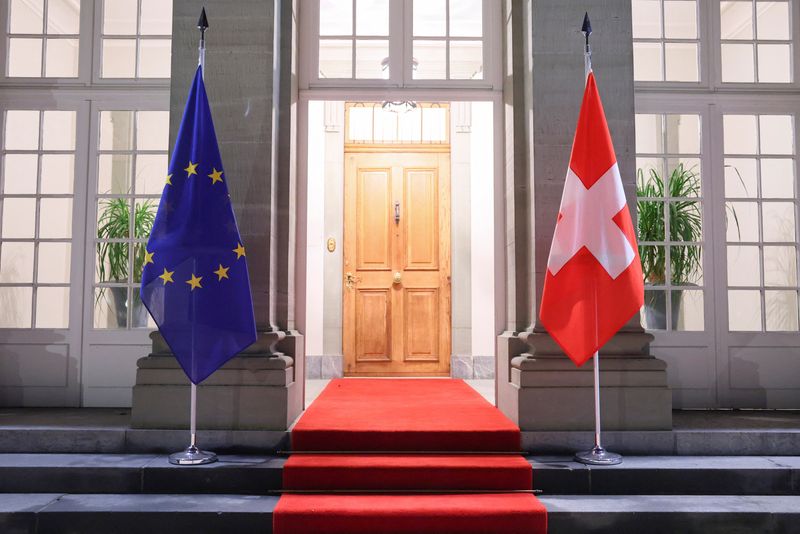By John Revill
ZURICH (Reuters) - Swiss business welcomed a new deal to overhaul the country's relationship with the European Union, bringing Christmas cheer to an economy that is set to be one of Europe's most resilient in a challenging 2025.
Corporate lobbies, economists and firms say the agreement unveiled on Friday stabilises relations with the bloc - which accounts for over half of Swiss exports - even if it still faces a difficult ratification process involving a likely referendum.
"Market access is crucial: European trade is a cornerstone of the Swiss economy," said Samad Sarferaz at the KOF Economic Institute at ETH, a university in Zurich. "The benefits will not be seen immediately, but will be there in the long run."
Switzerland's economy was already tipped to outperform its neighbours. UBS sees it growing in 2025 by 1.3% compared to 0.6% for Germany, 0.9% for France and 0.9% for the euro zone.
Without a deal, Switzerland would face potentially massive disruptions to trade and EU market access, said Sarferaz.
The EU accord will harmonise standards, allow access to research programmes and facilitate movement of people - with some protections to allay Swiss fears over mass migration.
It will help Switzerland's pharmaceuticals sector, which generates over 50% of Swiss goods exports, get access to the best workers and research, said Georg Daerendinger, spokesman for industry association Interpharma.
LEGAL CERTAINTY
Pharma giant Roche said it created planning and legal certainty. If Switzerland's mutual recognition agreement (MRA) with the EU for the sector is ultimately not updated, pharmaceutical products face higher costs, the firm said.
Rudolf Minsch, chief economist of business lobby economiesuisse, said the commitment to stability was a welcome tonic in a world riven by wars and trade tensions.
That was especially true given the weakness of Germany - Switzerland's top trade partner - and the Swiss franc's appreciation, which makes exports dearer.
"It used to be the case that when Germany got a cold, Switzerland got pneumonia," Minsch said. "No longer."
The strong franc has forced companies to be more efficient and specialise further. Switzerland has also sealed free trade deals with over 30 countries including India and China.
Low inflation, low interest rates and robust domestic demand backed by real wage growth have made the economy resilient, said Claude Maurer, chief economist at BAK Economics, a think tank.
Still, foreign demand is a worry, and the EU deal is unlikely to provide a quick fix for problems in neighbouring Germany, where the key carmaking industry is struggling.

"This year has been difficult and we're worried there isn't much light at the end of the tunnel," said Jean-Philippe Kohl, vice-director of Swissmem, a tech and engineering lobby which reported a 4.2% drop in sales in the first nine months of 2024.
"The EU treaty is only a starting point for Switzerland, but it's a step in the right direction."

